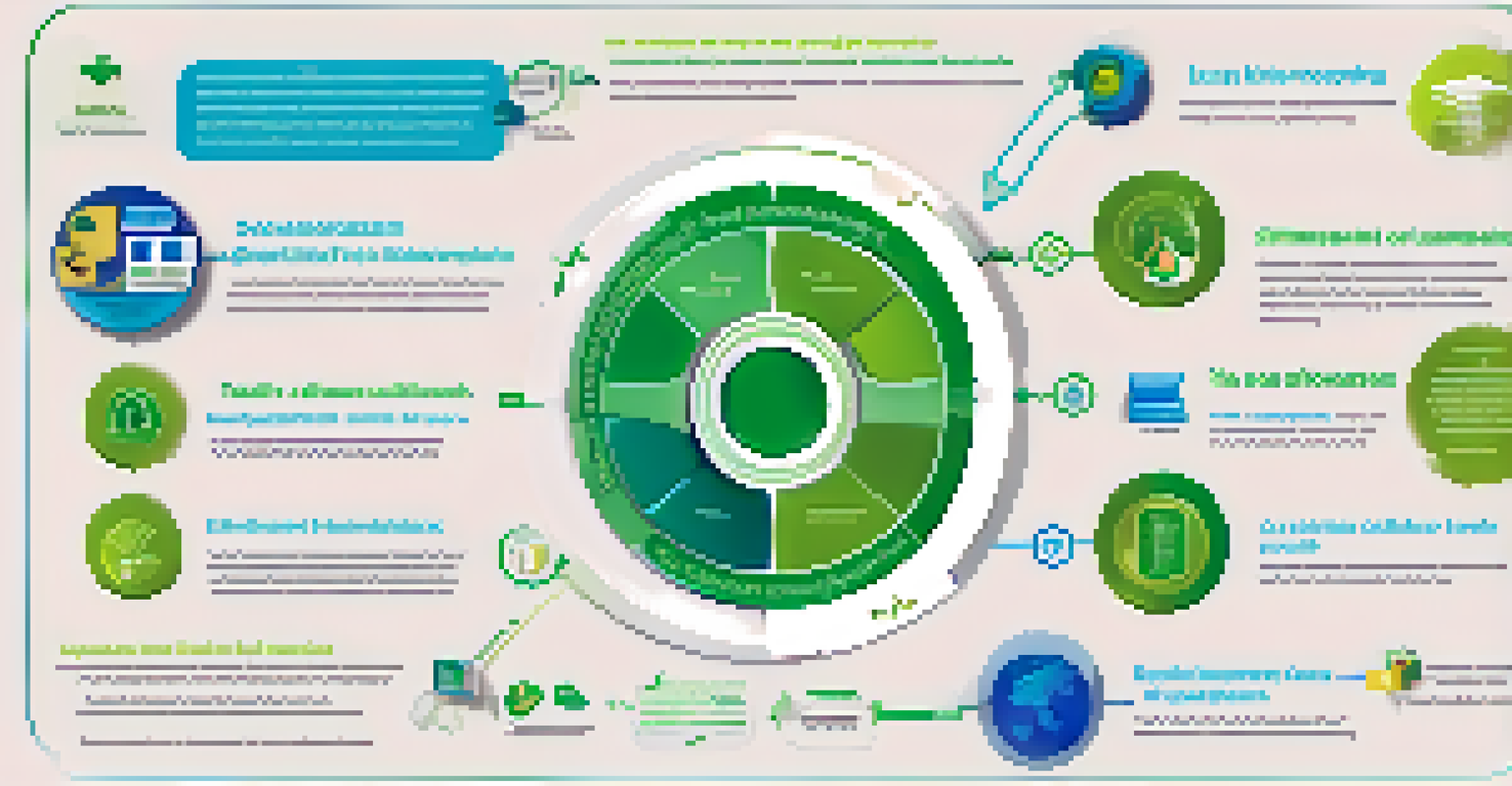Ethical Considerations in Educational Technology Development

Understanding the Role of Ethics in EdTech Development
Ethics play a crucial role in educational technology, serving as a guiding principle in how solutions are developed and implemented. With the rapid advancement of technology, it's essential to consider the impact these tools have on learners and educators alike. Ethical considerations ensure that the rights and dignity of all users are respected, fostering a safe and inclusive learning environment.
Technology is best when it brings people together.
Moreover, ethical frameworks help developers navigate complex situations, such as balancing innovation with user privacy. For instance, when creating an app that collects student data, developers must evaluate how this information is used and protected. A commitment to ethical practices not only enhances the credibility of the product but also builds trust among users and stakeholders.
In essence, integrating ethics into the development process can lead to technologies that genuinely enhance education rather than exploit it. By prioritizing ethical considerations, developers can create solutions that are not only effective but also responsible, paving the way for a more equitable educational landscape.
Data Privacy: Protecting Student Information
One of the most pressing ethical issues in educational technology is data privacy. As schools increasingly adopt digital tools, they collect vast amounts of data on students, including personal information and learning patterns. Developers must prioritize the protection of this sensitive data to prevent breaches and misuse, ensuring compliance with regulations like FERPA (Family Educational Rights and Privacy Act).

Consider a scenario where a learning management system inadvertently shares student data with third-party advertisers. This not only violates privacy but also erodes trust between students, parents, and educational institutions. Developers should implement robust security measures and transparent policies to safeguard user information, clearly communicating how data is collected, used, and shared.
Ethics Guide EdTech Development
Ethical considerations are essential in edtech to ensure user rights are respected and to create a safe learning environment.
By proactively addressing data privacy concerns, developers can create educational technologies that empower users rather than compromise their security. This approach not only aligns with ethical standards but also fosters a culture of responsibility within the edtech community.
Equity and Accessibility in EdTech Solutions
Equity in educational technology is about ensuring that all students have access to the same learning opportunities, regardless of their background or circumstances. Unfortunately, barriers such as socioeconomic status and disability can hinder access to these resources. Developers must consider inclusive design principles when creating edtech products to cater to diverse learning needs.
The future of education is not about technology; it is about people.
For example, if an app is designed without considering students with visual impairments, it may exclude a significant portion of the learner population. By incorporating features like screen readers and adaptable interfaces, developers can enhance accessibility and promote equity within educational environments. This not only benefits students but also enriches the overall learning experience for everyone.
Ultimately, prioritizing equity and accessibility in edtech development is not just a legal requirement but a moral obligation. When all students can engage meaningfully with technology, it creates a more inclusive educational landscape that fosters growth and learning for every individual.
The Importance of Inclusive Content in EdTech
Creating inclusive content is essential in ensuring that educational technologies resonate with diverse student populations. This means representing various cultures, backgrounds, and perspectives in the materials provided through these platforms. When students see themselves reflected in the content, it fosters a sense of belonging and engagement in their learning journey.
For instance, a history app that highlights contributions from diverse figures can help students understand the multifaceted nature of historical narratives. By embracing inclusivity, developers can create materials that not only educate but also empower students, encouraging them to appreciate different viewpoints and experiences.
Data Privacy is Crucial
Developers must prioritize data privacy to protect sensitive student information and maintain trust within educational communities.
Moreover, inclusive content promotes critical thinking and empathy, essential skills in our increasingly interconnected world. Developers should consider collaboration with diverse communities and educators to create content that is not only relevant but also respectful of all learners.
Ensuring Transparency in EdTech Business Practices
Transparency is a cornerstone of ethical practices in educational technology development. Developers should be open about their business models, data usage, and potential conflicts of interest. This clarity helps build trust with users, who need to feel secure that the tools they are using are not only effective but also ethical in their operations.
For example, if an edtech company partners with educational institutions, they should disclose how this partnership influences the content and features offered. Users deserve to know if their data is being monetized or if the app promotes specific products for financial gain. By being upfront about these aspects, developers can foster a culture of honesty and accountability.
Ultimately, prioritizing transparency ensures that all stakeholders—students, educators, and parents—can make informed decisions when choosing educational technologies. This commitment to openness helps cultivate a positive relationship between users and developers, reinforcing the notion that ethical considerations are at the forefront of the edtech industry.
Balancing Innovation with Ethical Responsibility
In the fast-paced world of technology, innovation often takes center stage, but it’s vital to balance this with ethical responsibility. Developers may feel pressured to rapidly create the latest and greatest educational tools, sometimes at the expense of ethical considerations. However, prioritizing ethics doesn’t have to stifle innovation; rather, it can enhance it by ensuring that new technologies meet the needs of all users.
For instance, a new app designed to gamify learning should be carefully evaluated for its impact on student engagement and mental health. If not done thoughtfully, it could lead to increased stress or competition among students. By integrating ethical reviews into the development process, teams can identify potential pitfalls and create products that genuinely enhance learning experiences.
Inclusivity Enhances Learning
Creating inclusive content in edtech fosters engagement and critical thinking by representing diverse perspectives and backgrounds.
Ultimately, embracing a mindset that values both innovation and ethical responsibility can lead to more sustainable and impactful educational technologies. When developers recognize the importance of aligning their creative efforts with ethical standards, they contribute to a future where technology serves education positively.
The Role of Stakeholder Feedback in Ethical EdTech
Engaging stakeholders—students, educators, parents, and community members—is crucial in developing ethical educational technologies. Their feedback provides valuable insights into the needs and concerns of those who will use the technology. By actively seeking input, developers can ensure that their products address real-world issues and adhere to ethical standards.
For example, conducting user testing and gathering feedback during the development phase can help identify potential ethical dilemmas before the product is launched. This collaborative approach fosters a sense of ownership among users and demonstrates that their voices matter in the process. It also helps developers to refine their solutions to better meet the needs of the educational community.

Incorporating stakeholder feedback not only improves the quality of edtech products but also reinforces the commitment to ethical practices. When users feel heard and valued, it creates a more positive relationship between developers and the educational community, ultimately leading to more effective learning tools.